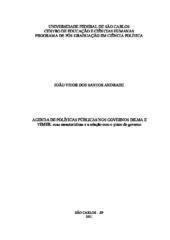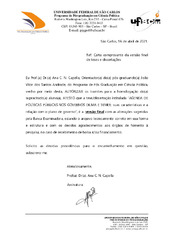| dc.contributor.author | Andrade, João Vitor dos Santos | |
| dc.date.accessioned | 2021-04-20T10:21:47Z | |
| dc.date.available | 2021-04-20T10:21:47Z | |
| dc.date.issued | 2021-04-05 | |
| dc.identifier.citation | ANDRADE, João Vitor dos Santos. Agenda de políticas públicas nos governos Dilma e Temer: suas características e a relação com o plano de governo. 2021. Dissertação (Mestrado em Ciência Política) – Universidade Federal de São Carlos, São Carlos, 2021. Disponível em: https://repositorio.ufscar.br/handle/ufscar/14150. | * |
| dc.identifier.uri | https://repositorio.ufscar.br/handle/ufscar/14150 | |
| dc.description.abstract | This research is part of the field of study of public policies, more precisely the stage of setting
priorities and forming the government agenda (policy agenda-setting). From the theoretical and
methodological framework developed and improved over the last decades by researchers in the
field, with emphasis on the theory of Punctuated Equilibrium by Baumgartner and Jones (1993)
and the Multiple Streams model by Kingdon (2014), we studied the variation on the
governmental agenda of the presidency of the Republic under the governments of Dilma
Rousseff and Michel Temer (2015-2018). The period that encompasses the research was
marked by an impeachment that changed the composition of the government, changing both
the actors present in this sphere of decision (turnover) as well as the agenda of priorities in
public policies. The objective of the study was to highlight points of proximity and distance
between the attention given to public problems at both times and to compare them with the
Government Plan, a document that contains the agenda released to voters during the electoral
campaign, pointing out what has changed and what causes of change. Thus, we analyzed the
variation in attention over time based on the data obtained through the content analysis of
normative and non-normative documents related to the government and the candidacy of the
elected slate. From the results, we can see that in the agenda presented during the election there
was a high attention to issues related to macroeconomics, a characteristic that remained on the
agenda of both governments with a continuous increase year after year, albeit with a change in
specificities. Issues related to social policies and civil rights, on the other hand, have seen a
reduction in attention. The effects of the economic and political crises had an impact on the
agenda, leaving economic and administrative issues in evidence and taking away the centrality
of the others, in addition to reducing the diversity of the agenda that started to focus on a reduced
number of issues. | eng |
| dc.description.sponsorship | Não recebi financiamento | por |
| dc.language.iso | por | por |
| dc.publisher | Universidade Federal de São Carlos | por |
| dc.rights | Attribution-NonCommercial-NoDerivs 3.0 Brazil | * |
| dc.rights.uri | http://creativecommons.org/licenses/by-nc-nd/3.0/br/ | * |
| dc.subject | Políticas públicas | por |
| dc.subject | Agenda governamental | por |
| dc.subject | Plano de governo | por |
| dc.subject | Agenda-setting | por |
| dc.subject | Public policy | eng |
| dc.subject | Governmental agenda | eng |
| dc.subject | Government plan | eng |
| dc.title | Agenda de políticas públicas nos governos Dilma e Temer: suas características e a relação com o plano de governo | por |
| dc.title.alternative | Policy agenda in Dilma's and Temer's government: characteristics and the relationship with the government plan | eng |
| dc.type | Dissertação | por |
| dc.contributor.advisor1 | Capella, Ana Cláudia Niedhardt | |
| dc.contributor.advisor1Lattes | http://lattes.cnpq.br/5810332148425938 | por |
| dc.description.resumo | Esta dissertação insere-se no campo de estudo das políticas públicas, mais precisamente na
etapa de definição de prioridades e formação da agenda governamental (policy agenda-setting).
A partir do referencial teórico e metodológico desenvolvido e aprimorado ao longo das últimas
décadas por pesquisadores da área, com destaque para a teoria do Equilíbrio Pontuado de
Baumgartner e Jones (1993) e o modelo dos Múltiplos Fluxos de Kingdon (2014), estudamos a
variação na agenda governamental da Presidência da República enquanto Dilma Rousseff e
Michel Temer ocupavam a cadeira de chefe do Executivo (2015-2018). O período que abarca
a pesquisa foi marcado por um impeachment que mudou a composição do governo, alterando
tanto os atores presentes nessa esfera de decisão (turnover) como também a agenda de
prioridades em políticas públicas. Foi objetivo do estudo destacar pontos de proximidade e
distanciamento entre a atenção dada aos problemas públicos nos dois momentos e compará-los
com o Plano de Governo, documento que contém a agenda divulgada aos eleitores durante a
campanha eleitoral, apontando o que mudou e quais as possíveis causas das mudanças. Com
isso, analisamos a variação da atenção ao longo do tempo a partir dos dados obtidos por meio
da análise de conteúdo de documentos normativos e não normativos ligados ao governo e à
candidatura da chapa eleita. Pelos resultados, constatamos que na agenda apresentada durante
a eleição houve uma elevada atenção às questões ligadas à macroeconomia, característica que
permaneceu na agenda de ambos os governos com aumento contínuo ano após ano, embora
com mudança nas especificidades. Questões ligadas às políticas sociais e direitos civis, por
outro lado, obtiveram redução na atenção. Os efeitos das crises econômica e política tiveram
impacto na agenda, deixando questões econômicas e administrativas em evidência e tirando a
centralidade das demais, além de reduzir a diversidade da agenda que passou a focar em um
número reduzido de questões. | por |
| dc.publisher.initials | UFSCar | por |
| dc.publisher.program | Programa de Pós-Graduação em Ciência Política - PPGPol | por |
| dc.subject.cnpq | CIENCIAS HUMANAS::CIENCIA POLITICA::ESTADO E GOVERNO | por |
| dc.subject.cnpq | CIENCIAS HUMANAS::CIENCIA POLITICA::POLITICAS PUBLICAS | por |
| dc.publisher.address | Câmpus São Carlos | por |
| dc.contributor.authorlattes | http://lattes.cnpq.br/1119437863992427 | por |


